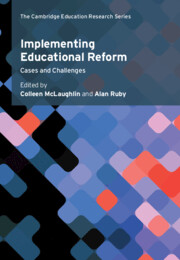Book contents
- Implementing Educational Reform
- Implementing Educational Reform
- Copyright page
- Contents
- Figures and Tables
- Contributors
- Preface
- 1 Why Focus on Implementation in Education Reform?
- 2 Promoting Equity in Education through System Change
- 3 A Decade of Reform in Hong Kong
- 4 Reforming a Whole School System
- 5 The Challenges and Opportunities of Greater Autonomy for Post-Soviet Universities
- 6 School Improvement by Design
- 7 Promising Practice in Government Schools in Vietnam
- 8 Reform Implementation Lessons
- 9 Qatar’s Road to Education Reform
- 10 Implementing Educational Reform
- Index
- References
5 - The Challenges and Opportunities of Greater Autonomy for Post-Soviet Universities
An Illustration from Kazakhstan
Published online by Cambridge University Press: 19 November 2021
- Implementing Educational Reform
- Implementing Educational Reform
- Copyright page
- Contents
- Figures and Tables
- Contributors
- Preface
- 1 Why Focus on Implementation in Education Reform?
- 2 Promoting Equity in Education through System Change
- 3 A Decade of Reform in Hong Kong
- 4 Reforming a Whole School System
- 5 The Challenges and Opportunities of Greater Autonomy for Post-Soviet Universities
- 6 School Improvement by Design
- 7 Promising Practice in Government Schools in Vietnam
- 8 Reform Implementation Lessons
- 9 Qatar’s Road to Education Reform
- 10 Implementing Educational Reform
- Index
- References
Summary
Reforms in the governance of higher education institutions in Kazakhstan to foster higher quality higher education systems, granting greater institutional autonomy, provide an opportunity to study the implementation challenges in moving from centralised systems controlled by Ministries to ones where institutions can pursue their destinies. This case suggests that moving towards a more autonomous system comes at a cost. Being free to set institutional strategies brings the possibility of making mistakes, something many leaders who have been trained in a compliance-based system find daunting. Further, if leaders have never operated in a more market-based system, their ability to scan the environment to determine and launch new initiatives can be a challenge. Such pressures can result in institutions reverting to compliance-based models which signal to the larger society that they are being responsible and faithful to prior norms of behaviour. In contrast, autonomy requires different systems of accountability.
Information
- Type
- Chapter
- Information
- Implementing Educational ReformCases and Challenges, pp. 91 - 104Publisher: Cambridge University PressPrint publication year: 2021
